The legal process against Monsignor Jose Leonardo Urbina Rodriguez51, has shown several “irregularities” that make a fair trial against the religious impossible, warned former judicial officials Boanerges Fornos and Yader Morazán, in a panel on the program This week.
The regime of Daniel Ortega and Rosario Murillo imprisoned and accused the monsignor for the alleged rape of a minor under 14 years of age. However, religious and parishioners affirm that the arrest of the priest is a political issue. Urbina, parish priest of the Church of Perpetuo Socorro, in Boaco, expressed solidarity with the citizens who protested against the Government in 2018 and asked for the political prisoners on several occasions, so it would be an objective of the dictatorship.
The prelate was arrested last Thursday in Boaco, although the first hearing was held in the Managua Courts, where he was given preventive detention. An irregularity that has been repeated in cases against political prisoners, who are arrested in their cities, but tried in the capital.
Morazan, A specialist in the administration of justice, indicated that another irregularity in the first hearing is that the priest was not allowed to present a lawyer he trusted. “They assigned him a defense attorney from the Public Defender’s Office, who, as in all processes, has only managed to make an appearance of defense, because they do not make any type of legal technical opposition within the process and only serves to validate an action that is clearly making it totally illegal.”
For Fornos, a former departmental prosecutor, the trial against Urbina will be “a repetition or reissue of the process against the priest of Nandaime (Manuel Salvador Garcia Rodriguez), in which no guarantee was given, he was sentenced despite the fact that he had not committed any criminal act and that the alleged victim said that the events did not occur as narrated by the Prosecutor’s Office.
“If we take the day off from the day before, there is definitely no guarantee of legal certainty for criminal proceedings, particularly against this priest now,” Fornos commented.
García Rodríguez, parish priest of the Jesús de Nazareno church in Nandaime, Granada, was sentenced to two years in prison for the alleged crime of threatening five people with a knife and a fine of 14,116 cordobas or 200 days in fines.
“media show”
Morazán highlighted “all the publicity and the media show that has been made around this issue. I worked for more than five years specializing in violence against women and it is the first case in which it is publicly exposed.”
“There has been a consensus, in these types of issues, that modesty, the integrity of the victims and any type of data that can (damage) the integrity of the victim must be protected,” he commented.
“In the first hearing, the grandmother appeared seated together with a police officer and together with the witnesses, when that is not usual in this type of hearing, since the first hearing is only informative, where she is put in knowledge to the accused of the facts that are being imputed to him, “he explained.
Morazán stressed that before the accusation against the monsignor there was “an antecedent” or “a dispute” between the alleged victim’s grandmother and the priest. She had agreed, according to a mediation agreement, to pay about 300 dollars of the cost of an awning, which was stolen by a son of the lady in the church.
“In that same agreement they sign five points, the first of which is that they are going to respect each other, both commit themselves, both the priest and the grandmother; apart from the commitment to financially compensate the cost of the awning”, he pointed out.
Role of the diocese
The Presbyteral Council of the Diocese of Granada, which also serves Boaco, chaired by Monsignor Jorge Solórzano, urged through a message “not to be carried away by discouragement, nor lose hope.”
“We thank God for your prayers, affection and solidarity in these difficult times, your compassion unites us in the suffering caused by the imprisonment of Fathers Manuel de Salvador García and Monsignor Leonardo Urbina, with them we all stand in the hands of the Lord”, details the message.
Fornos stressed that “the only thing left for the Diocese (of Granada) is to be supervising, monitoring and denouncing the violations of due process that are going to occur.”
“The diocese does not have a real advocacy capacity and the most that could be is to guarantee some type of legal assistance, so that the guarantees to priest Urbina are respected, although there are no guarantees that this will happen,” he added.

















